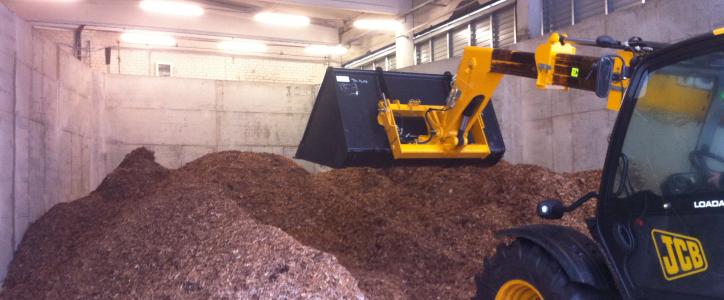
In March 2012, JSC ENG completed the project Reconstruction of Garliava district boiler plant installing technological equipment burning bio-fuel for the generation of heat, with a value of around 6 million LTL.
During the project, two water boilers were dismantled in the Garliava district boiler plant owned by SC Kauno energija replacing them with a new 5.2MW water heating bio-fuel boiler with 1.3MW smoke condensation economizer Danstoker VP13 (product No. 11-0340) produced by a Danish company. The total thermal output of the bio-fuel boiler plant is about 6.5MW. A new 25m high chimney was built in the territory of the boiler plant. The fuel supply storehouse was fitted in the former chemical water management building of Garliava district boiler plant from which scraper conveyors supply the bio-fuel to the furnace of the bio-fuel boiler plant.
The project was funded from JSC ENG corporate funds. The project was implemented in the period from July 2011 to June 2012. The project contractor was JSC Axis Technologies.
Over a year the new bio-fuel boiler plant can generate up to 30 GWh of heat which is supplied to Garliava heating supply consumers through the Garliava heat network that is managed by SC Kauno energija. During the heating season, the heat generated from bio-fuel will account for 80 percent of all heat consumption in Garliava, while in the non-heating season it will reach 100 percent.
Garliava power generation facilities, using bio-fuel, is one of the first in Lithuania to be financed according to the funding model of the Energy Service Company (ESCO), i.e. the construction of facilities is funded by the ESCO which is also responsible for their operation for a set period of time. In applying this funding model, a triple benefit is obtained: the bio-fuel used for the generation of thermal energy is less expensive than that of natural gas, the heat generated in the boiler is sold by SC Kauno energija at a lower price than heat generated using natural gas, and the investment company receives income for the thermal energy generated from the bio-fuel.
The purpose of this project of JSC ENG was to reduce the dependency of heating supply consumers on the rising prices of imported natural gas and fuel oil and to reduce the growth of thermal energy prices for consumers.